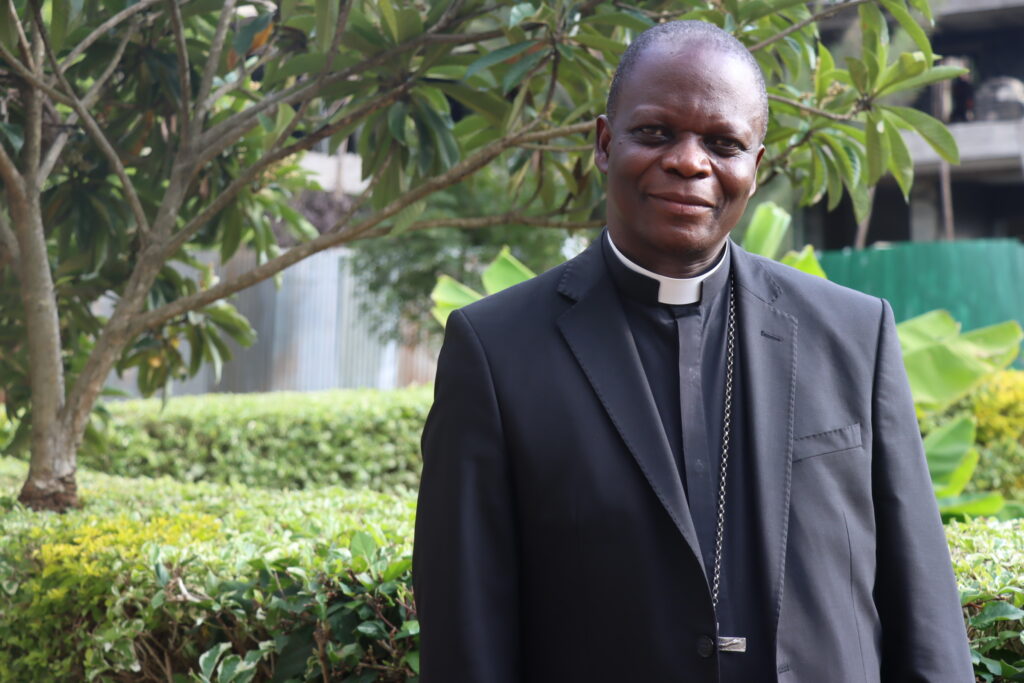KENYA: Agents of Evangelization in Kisumu Archdiocese Embrace Collaborative Ministry

Archbishop Maurice Muhatia Makumba
Sr. Jecinter Antoinette Okoth, FSSA
Collaborative ministry aimed at enhancing synodality and working together by agents of evangelization has been emphasized in Kenya’s Kisumu Archdiocese, Archbishop Maurice Muhatia has said.
Sharing in an interview with AMECEA Online after a recent workshop that brought together the clergy, deacons, Consecrated men and women within the Archdiocese of Kisumu, the Local Ordinary Archbishop Maurice Muhatia Makumba has stressed that “collaborative ministry helps to draw the consciousness for the agents of evangelization working in the same Archdiocese to realize that we stand to be more successful when we collaborate more closely.”
He clarified that when agents of evangelization are aware of each one’s vocation and their respective apostolates which contribute to the same goal, then the pastoral care and human development for the people within the Archdiocese will strengthened.
According to the Prelate who has been at the helm of the Archdiocese since the year 2022, the recent meeting for the agents of evangelization was the second of such kind aimed to build mutuality for the success of the pastoral work in the Archdiocese and the “First one was held last year for familiarization.”
During the interview with AMECEA Online, the Archbishop stressed the significance of collaboration saying, “It is important for people working especially in an institution like the Church and in the same Diocese to truly collaborate and share experiences and have that mutual respect and expression of mutual love among themselves.”
Since God has called each and every one of us to participate and work in his vineyard he continued, “The more we encourage collaboration, interact and realize the importance of each other and the benefit of working together in unity, the more we stand to be successful as agents of evangelization.”
He referenced Acts of the Apostles (6:1-8) to highlight that “when they priests, deacons and religious men and women work together, they become witnesses in the sense of how the Acts of the Apostles talk about the ideal community.”
“Because of the closeness and collaboration of the Apostles, the people looked at them and exclaimed, see how they love each other,” the Archbishop recounts the message in the scripture and relates to his expectation for the priests, deacons, Religious men and women on togetherness in the Archdiocese, a gesture which he says “will make the pastoral work more authentic.”
He narrated further, “The opposite is also true when we appear to be in conflict and at logger heads with each other we de-evangelize and send the wrong message to our people about our vocation, our apostolates and ministries.”
“We therefore need to interact with each other in a friendly and loving way. We need to support each other and to reduce disagreement among ourselves especially in the course of the performance of our apostolates and when interacting with our people,” he said.
As one way of ongoing formation among agents of evangelization in the Archdiocese, the Archbishop hopes to have such encounters biannually where the priests, deacons and religious discuss various contemporary topics depending with the signs of time.
Other than the theme on collaborative ministry which was stressed for agents of evangelization, the participants during the workshop also shared on Religious against human trafficking as a pertinent issue in the society.
“We also talked about this sensitive topic on human trafficking and how it manifests itself in the society today,” Archbishop Muhatia disclosed and expounded, “The presentation opened our eyes to know that at times those involved in these inhuman activities, to some extent are those who are very well known to the person being trafficked.”
“So, this presentation was an eye opener to various aspects happening in this modern slavery. We were left enlightened so that we can also be in a position to do whatever is in our power to minimize occasions of human trafficking,” the Prelate said during the interview and concluded that having various themes for agents of evangelization helps in capacity building, “so we can render services to our people selflessly and with adequate knowledge.”


